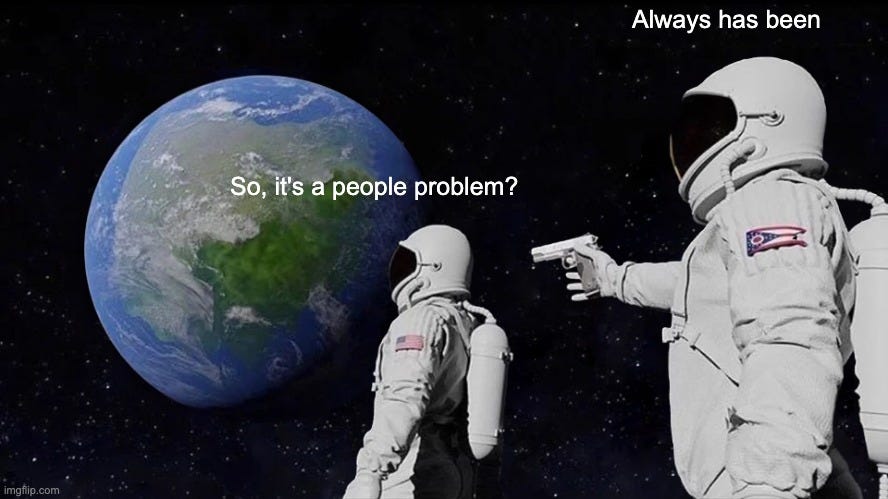What we can all learn from Larry the Cow
Celebrating another year on the tech rollercoaster

Well done everyone, we made it! Another year on the crazy rollercoaster that is technology! People wearing strange digital ski masks were found wandering around in an augmented reality bubble. Space X caught 275 metric tons of Super Heavy with a pair of oversized chopsticks.
We watched a simple software update cause the largest global IT outage, and then just a week later, an outage of both Microsoft and Amazon cloud services on the same day. There was a bit of chatter about AI that you might have missed? And, all this whilst the Great Tech Reset made us all question why we continue to ride this rollercoaster.
This year, I have been tremendously honoured to speak with engineers, developers and IT leaders across a broad spectrum of industries and geographies. It's my favourite and the most rewarding part of my job, but it can also be frustrating. In these conversations, I've noticed a common thread—we in tech have a tendency to see every challenge through the lens of technology, searching for technical solutions to what are often fundamentally human problems.
Twenty years ago, I learned perhaps the most important lesson of my IT career.
What I learned from Larry The Cow
When mastering my craft as a system administrator, I became fascinated with speed and efficiency. Disenfranchised by the bloat and opinionated builds of CentOS and RHEL, I followed Larry the Cow down the path of enlightenment and decided all the servers at our little SaaS start up should be running Gentoo Linux! For those not in the know, Gentoo is like Linux the Hard Way. I spent weeks tweaking, tailoring and compiling the worlds most perfect Linux server.
It felt amazing. I was able to exercise all my skills to build something awesome.
Pride, Performance, and a Humbling 8%
The problem came when it was time to expand our team. I interviewed countless engineers, but none had the skills I needed to maintain and improve what I had built. It took longer than I’d like to admit before I began to think about what the real problem might be. Sure, what I had built was awesome … but how awesome was it? Was the performance improvements worth it?
My co-founder and life-long friend, Gavin Brown, helped formulate a bake off… one of my zero-fat, uber-optimised, Gentoo Linux servers versus his default install of CentOS running CUPS and god knows what other stuff we didn’t need. To this day, I still don’t understand why a single daemon triggers me so much, but I spent a week tweaking each compiler argument to the specific cpu instruction set and waited patiently for many, many hours while every component was compiled from scratch.
The day of the big race, I wasn’t disappointed … my Gentoo box out-performed the competition on every benchmark that Gavin could throw at it! Success! Vindication! Relief! Pride.
Those feelings were short-lived though. Sure, it was faster … by a whopping eight percent. That afternoon, I rebuilt our entire environment with stock CentOS installs, following all the standard, documented practices. We were able to easily find and hire engineers with RHCE qualifications and I continued to guide the team to favour simplicity over perfection.
The Most Complex System is People
We all strive in our own way to prove to ourselves, and others, that we’re good at something. In the IT industry in particular, there is a tendency for us to believe that what we’re doing is really hard and others just don’t understand how important it is to get it right. Meanwhile, we wonder why teams from other disciplines are struggling - it can’t be that hard, right?
The true measure of technical excellence isn't just in what we can build—it's in how we can empower others to succeed. The most valuable skill I've developed didn’t come from a reference manual; it was recognising that success in technology isn't about building the perfect system, it's about building systems that help people work together more effectively.
I could write a book on this topic, but let me instead leave you with a few thoughts.
Being good at something isn’t about what you can do; it’s how you can help others. It might not always feel like it, but Corporate is a team sport.
We all need to feel useful and appreciated. There’s lots of ways to achieve that; not all of them obvious. Helping makes you happy.
I don’t like stereotypes, but “communication” generally isn’t a strength in most IT departments. Research suggests neurodiversity in tech is as high as 50%. We could all benefit from understanding more about the symptoms of ADHD or Autism, particularly those in the high-functioning category.




